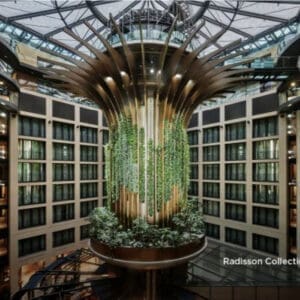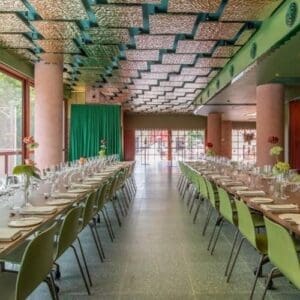 Bees are the most effective animal pollinators on earth, but loss and fragmentation of habitat leaves hundreds of thousands of bees without space to nest. Spring is a time of renewal for solitary pollinator bees, which make up 90 per cent of the bee population and are responsible for the pollination of one-third of the food we eat. For the second year in a row, two brands with a rich history in bee sustainability have come together to support Canadian bees and better their chances of flourishing this spring.
Bees are the most effective animal pollinators on earth, but loss and fragmentation of habitat leaves hundreds of thousands of bees without space to nest. Spring is a time of renewal for solitary pollinator bees, which make up 90 per cent of the bee population and are responsible for the pollination of one-third of the food we eat. For the second year in a row, two brands with a rich history in bee sustainability have come together to support Canadian bees and better their chances of flourishing this spring.
Burt’s Bees Canada and Fairmont Hotels & Resorts have announced that they have expanded their WILD FOR BEES partnership by installing 16 uniquely built bee hotels across Canada, including three major bee hotels in downtown Vancouver. This brings the total number of hotels to 21 since the WILD FOR BEES partnership began in 2014.
Important national partners on this project include Pollinator Partnership Canada and Sustainable.TO Architecture + Building (Sustainable.TO), a leading Canadian architecture firm. Sustainable.TO led the design and construction of the bee hotels nationwide, while Pollinator Partnership Canada provided strategic guidance and expertise on pollinator health. In Vancouver, Hives for Humanity built the bee hotel the Fairmont Waterfront will host.
“Solitary bees are a critical part of sustainable urban food production and habitat loss is a real impediment to bees’ ability to pollinate much of the food that we rely on across Canada,” said Jane Mackie, vice president, Fairmont Brand. “By building more than a dozen luxury bee hotels from coast to coast, we are doing our part to build a more sustainable world.”
For more than a decade, through its Bee Sustainable initiative, which is part of the luxury hotel brand’s larger Fairmont Sustainability Partnership program, Fairmont has committed itself to improving the overall health and conservation of bee species globally, and has built more than 20 apiaries and eight pollinator bee hotels at properties around the world.
For the fourth year running, Burt’s Bees is proud to spearhead WILD FOR BEES in support of solitary pollinator bees. While bees are undoubtedly a key component of the company’s success – 95 percent of its products contain beeswax or honey – it is the role bees play in the continued health of the ecosystem that spurred the company into action.
“Solitary bees don’t make honey, but they do play an incredibly vital role in ensuring that we have fresh, nutritious food to eat all year round and that’s something that is very important to each and every one of us,” said Carolyn Hungate of Burt’s Bees Canada. “Pollination is a beautiful thing, and as an all-natural beauty company, we want to help ensure that we safeguard our natural world. We couldn’t be more thrilled to continue working as a team with Fairmont Hotels & Resorts and other partners to build bee hotels across Canada, all in the name of bee health.”
Pollinator bee hotels are sustainable nesting spaces for solitary pollinator bees. While other types of bees, like honeybees and bumblebees, typically work and nest in groups, solitary bees visit flowers and nest individually; without a queen or a hive, solitary bees must seek out nesting grounds on their own. The WILD FOR BEES bee hotels provide solitary bees with a safe place to rest their weary wings.
“Bees need two things to make more bees – they need food in the form of flowers, and a place to nest – bee hotels, ground nests, and natural habitats,” said Vicki Wojcik, research director of Pollinator Partnership. “If every Canadian household were to build a bee hotel, we would have close to 17 million new bee habitats. If each of these were used by one bee to make a nest for 10 baby bees, that’s 170 million more native bees to pollinate our food and flowers.”
The 16 new bee hotels built in 2015 include six located at Fairmont properties in Vancouver, Whistler, Edmonton, Winnipeg, Ottawa and Quebec City and ten in public spaces across the country in Vancouver, Calgary, Toronto and Halifax. This year’s coast-to-coast program follows the successful launch of the bee hotel program in 2014, when the first pollinator bee hotel debuted atop the iconic Fairmont Royal York along with four others across the Greater Toronto Area.
“We are incredibly proud of the progress made across Canada in partnership with Burt’s Bees and others to improve the conditions that contribute to bee health and urban food production,” said Alexandra Blum, vice president, public relations and global partnerships, FRHI Hotels & Resorts, the parent company of Fairmont.
“What you do for one type of bee helps all bees, all pollinators and in fact all people,” explains Wojcik. “All Canadians are directly or indirectly connected to bees each and every day of our lives. One of every three bites of food that we eat is pollinated. It takes approximately one pollinator bee to produce 40 to 70 apples. Even the grains and meat that we eat benefit from having pollinators support the landscapes they grow or are raised in.”
To build further awareness and raise financial support for the project, Burt’s Bees is launching a new, limited-edition kit, The Honeymoon Suite, during Pollinator Month. During the month of June 2015, 100 per cent of profits from this kit, which includes five classic Burt’s Bees products, will go toward the country-wide expansion of the WILD FOR BEES hotel initiative.
Also in celebration of Pollinator Month, participating Fairmont properties across Canada will offer specially crafted pollinator menus and signature drinks. Burt’s Bees will be present at select Fairmont hotels during the month of June to provide family-friendly educational experiences to guests and community members who want to learn more about pollination. Burt’s Bees all-natural lip balms will also be sold on site.
The Honeymoon Suite will be available at burtsbees.ca and The Fairmont Store at the Fairmont Royal York, before launching nationally at Burt’s Bees vendors in July. The limited-edition kit retails for $14.99 CAD.
Since launching WILD FOR BEES in 2012, Burt’s Bees and partners have raised more than $50,000 for Pollinator Partnership Canada. This spring, Burt’s Bees has set the bar even higher, by aiming to raise an additional $125,000 by year’s end.















